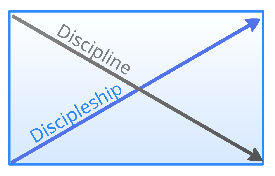3 May 2017
The last time my mom tried to spank me, I was just about as big as she was. Of course, my mother is a pretty small lady! As she approached me in the hallway with the discipline utensil, I reasoned with her, “Mom, can’t we talk about this?”
“No!” was her answer, and she just kept coming.
I continued to try to talk to her about it, but she had no intentions of talking. Finally, I reached out and took the paddle from her! I shudder to think what would have happened if my Dad had been home at the time!
I honestly don’t remember what transpired after that. But this story serves to illustrate how parenting will eventually reach a point that it must move from discipline to discipleship. At this stage, our children are old enough to talk to and teach, but they also still need firm direction!
God gives parents, particularly fathers, the responsibility to both discipline and disciple their children.
Fathers, do not provoke your children to anger, but bring them up in the discipline and instruction of the Lord. (Ephesians 6:4)
Let’s look at these two areas in turn and then see how they relate to one another.
Discipline
First, parents have authority to discipline their children. (See Proverbs 13:24; 22:15; 23:14; 29:17; Hebrews 12:7-11.) Discipline is the use of external motivation to train behavior. It can take various forms of negative consequences for wrong behavior. There are also positive ways of encouraging good behavior through affirmation and rewards.
Here are a few basic tips for effective discipline:
• Train your children to look you in the eye when you speak to them.
• Train your children to respond respectfully in response to your instructions, “Yes, sir” or “Yes, ma’am.”
• Train your children to obey the first time. Your children will learn when you expect them to obey. If you count to three, they will wait until two. If you count to ten, they will often wait till you count nine. If you don’t discipline your children until after you yell at them, then they will not obey you until you yell at them. If you lovingly, calmly and consistently discipline your child the first time they disobey, they will learn to listen the first time you give an instruction.
• Never spank out of anger or in such a way that would cause harm to your child.
• Hold your child responsible for only what they understand.
• Be creative with ways of giving your children consequences for disobedience and disrespect.
Discipleship
The next and most important responsibility parents have is discipleship. When Jesus answered the question about the most important commandment of all, he quoted from Deuteronomy 6:4. Look at what Moses said right after this most important commandment!
You shall love the LORD your God with all your heart and with all your soul and with all your might. And these words that I command you today shall be on your heart. You shall teach them diligently to your children, and shall talk of them when you sit in your house, and when you walk by the way, and when you lie down, and when you rise. (Deuteronomy 6:5-7)
The ultimate goal for parents is to raise mature, Christ-loving believers. This, of course, fits into God’s ultimate purpose for all people and our mission of helping others to love God.
Our American culture has eroded the strength of the family by encouraging parents to abdicate to others their responsibility of teaching their children. Many parents feel it is the church’s job to disciple their children. They depend on the pastor, the Sunday school teacher and the children’s or youth pastor to teach their children about God. Pastors, and the rest of the body of Christ, are certainly responsible for discipleship. But the primary responsibility of discipleship belongs to parents.
Transitioning from Discipline to Discipleship
When each of my children turns eight, I bring them into my office and explain to them that it is time to turn their lives over to Christ. I explain the gospel to them and then tell them to pray to receive Christ, or I ground them until they do.
No need to read that paragraph again. I’m just kidding. Not only would I not do that, I couldn’t! Faith and a real relationship with Christ are based on the free choice of the individual. This helps us understand how different the parental responsibilities of discipline and discipleship are. As we have noted, discipline uses external motivation to bring about a change in behavior. Discipleship is leading by example and guiding children towards giving their hearts to Jesus.
Now let’s address the sticky subject of how discipline and discipleship relate to one another. Sometimes parents try to teach their children when they should be disciplining them. Sometimes they discipline them when they should be teaching. Often both take place at the same time. The most important mistake parents make is not disciplining at all!
As I mentioned before, one of the most confusing times in parenting is when the children should be transitioning out of discipline into discipleship. Parent need to discern when to move from discipline to discipleship, from external motivation to internal motivation (Proverbs 13:24; Proverbs 23:26). Here is a chart that helps explain the process. The chart moves from left to right following the age of a child, from birth to adulthood.

Both discipline and discipleship may take place the entire time your children are in your home. However, when a child is very young, parents exercise maximum control (or discipline) in their lives. This is when behavior training begins. At this time, there is a lot of discipline and not as much discipleship taking place. Then as the child grows, he develops his ability to respond to God. He can choose to obey his parents willingly, not just because he fears the consequences. He can take care of his stuff and get along with his siblings out of a heart of obedience to God. The cross point on the chart generally occurs around ages twelve to fourteen, depending on the development of the child. As you relate to your teenaged child, your desire is to primarily teach them, to appeal to their conscience and desire to obey God. While discipline is based on power (the ability to carry out consequences), discipleship is based on influence, which is built on relationship. This is why it is so important to build strong, open relationships with your children.
Here are a few ways you can help your children develop self-motivation based on faith in Christ.
• Pray for your children to surrender their hearts to Christ (Ephesians 3:14-21).
• Teach your children truth from God’s Word (Psalm 19:7-11).
• Teach your children God’s purpose for life and how everything we do fits into it (Deuteronomy 6:4-9).
• Encourage and affirm your children (1 Thessalonians 2:11-12).
• Offer new responsibility and freedom in response to obedience and respect (Matthew 25:14-30).
• Give correction in the form of discipleship, instead of discipline, when there is respect and teachability (Psalm 25:8-15; 32:8-9).
• Give your children the freedom to make choices so they can develop conviction (Hebrews 5:14).
• Help your children discover their gifts, talents, and interests. Free and equip your children to pursue them (Ephesians 4:7, 11-12).




